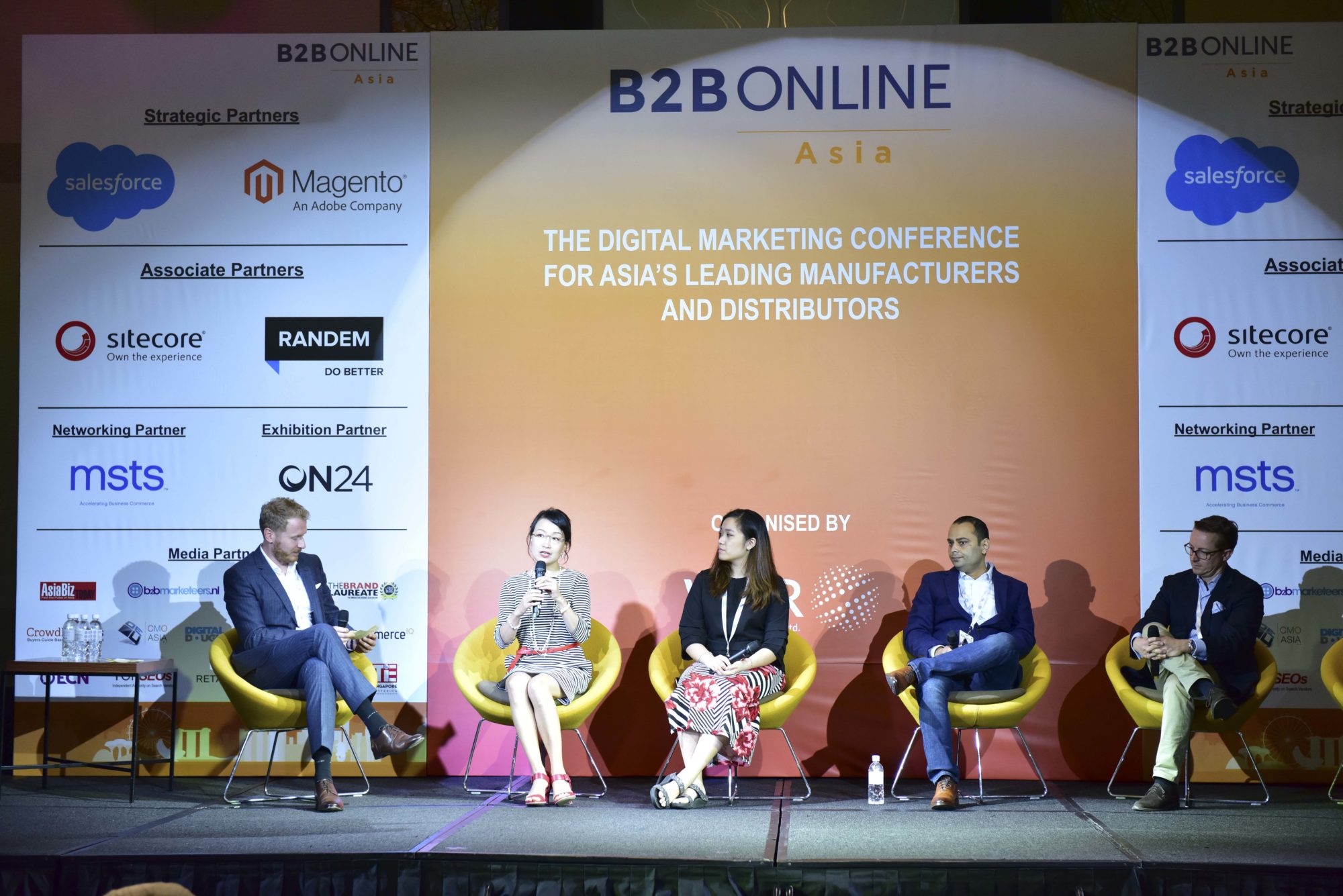By Manoj Aravindakshan Singapore: If there was one recurring theme at the first B2B Online Asia Conference, it was the need for focus on “Customer Experience”. The key drivers for designing and delivering the desired customer experience? People & data.
Organised by WBR, B2B Online Asia was a 2-day event held in Singapore recently that brought together about 150 senior management professionals from leading manufacturers and distributors across Asia, including Huawei, 3M, HP, Sharp Electronics, Asian Paints, GE Power, Lenovo, Honeywell, Unilever, Saint Gobain, ST Engineering, Ricoh Asia Pacific, Infineon Technologies, ASUS Global, Schneider Electric, Epson, Dow Chemical, Volvo Construction Equipment, Hyundai Heavy Industries, Omron Asia Pacific and Fuji Xerox.
While ‘Customer experience’ was a term that was used more frequently in a B2C context, the increased focus by B2B marketers and managers on this theme is a clear indicator of the changing behaviors among B2B buyers.
According to Keunho Kim, Partner & Head of B2B Asia Pacific with Ogilvy Consulting, “Customer experience is the new brand.” The mantra for companies, even when the fall into the B2B bucket, is “consumers first”, as businesses look to find new ways to connect directly with the consumer. The disruption caused by traditional B2C companies – Grab, Uber, AirBnB, for example- who are making rapid strides into serving corporate customers by aggregating demand are likely playing a key role in driving this shift in mindset.
Citing that 81% of B2B buyers want the same digital experience that they get as a ‘consumer’, Nicholas Kontopoulos, Head of APAC & EMEA Commerce Marketing at Magento, said that “Customer experience is critical for self-actualisation” in the B2B buyer’s equivalent of Maslow’s hierarchy of needs. This has serious implications for B2B marketers, who risk ‘digital Darwinism’ if they do not get out of their comfort zone and cater to this demand. “Great customer experience is not just the domain of the sales & marketing function; the entire organisation has to think of this,” added Kontopoulos.
Use data to engage with customers
Contrary to the general perception, the “mobile” channel is quite critical to delivering the desired B2B customer experience, pointed out Andrew Antal, Marketing Director of Salesforce in his presentation. In fact, he advocated a mobile-first approach to B2B customer engagement. Companies should focus on knowing everything about their customers by breaking down and integrating data silos and then engage with them across the entire customer journey, including using online-n-offline engagement models.
He urged marketers to make engagements fresh, frictionless, personalised and meaningful. Highlighting the importance of a data-driven approach to customer engagement, he also suggested that companies should develop strong analytics skills in-house to unearth and unleash the full potential of data available within their organisations.
Business goals, people and process over technology in digital transformation
As B2B companies pursue their ‘digital transformation’ journeys and shift more of their buying and selling to online channels, they should focus more on people and process rather than new technology, said Nicholas Kontopoulous. “An old process with new technology will only result in an expensive old process,” he warned.
Hanson Wang, Chief Digital Officer, APAC of Saint Gobain, a manufacturer of construction and high-performance materials shared a similar view. “IT cannot be leading the digitalisation of business; it has to come from the business side and be supported by technology.” Hanson wanted companies to fully understand what digital transformation entails. “Digital transformation is really about changing the business model, and not just making a change in the business. If there is no change to the business model, then it isn’t really right to call it ‘digitalisation’ of a business.”
Dennis van Heezik, CEO, INSEE Digital, CIO and Chief Digital Officer of Siam City Cement, echoed the same sentiment. “Digital strategy by itself is meaningless. Companies should have a business strategy where digital is key. Also, change cannot happen without change agents.”
Farrukh Shad, Senior VP eCommerce, Schneider Electric, spoke about his organizations’ B2B eCommerce journey– starting with experimentation and agile pilots 3 years ago to a full-fledged business model today. Emphasizing the people part of this transformation journey, he said, ‘The biggest challenge with transformation is to make people unlearn a lot of what they have learnt!” He spoke at a panel discussion on creative leadership needed for digital transformation and about developing the right capability & mindset internally.
Businesses should be prepared to invest significantly in change management if they want to really succeed with shifting to online commerce, pointed out Ganesh Kashyap, Global Senior Director of eCommerce, of Mondelez International.
One-size fits all approach doesn’t work
Despite the growing similarities and convergence in expectations of B2B buyers with those of “consumers”, businesses need to understand the differences and strategize accordingly, warned Lynn Huang, Head of Marketing, Asia & Pacific, Honeywell
“B2B e-commerce is certainly trickier than B2C. That’s because the end users of the enterprise products are different from the products’ purchase decision makers. Final customer experience is often not entirely in suppliers’ control. There is not a single formula/approach that can be adopted for B2B e-commerce. Different approaches have to be carefully considered. For example, Honeywell sells Muck Boots safety footwear online in North America, Oliver safety footwear through local Australian distributors’ e-commerce platforms, while in China we rely on marketplaces like JD.com.”
“The biggest challenge is probably logistics and fulfillment rather than product/marketing,”said Lynn.
Manoj Aravindakshan is Founder of On Target Media, a content & search marketing company in Singapore. He is also the Editorial Director of AsiaBizToday.com, a website focused on business stories and entrepreneurs from Asia.


